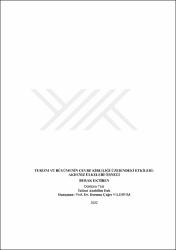| dc.contributor.advisor | Yıldırım, Durmuş Çağrı | |
| dc.contributor.author | Ektiren, Burak | |
| dc.date.accessioned | 2023-04-27T20:41:12Z | |
| dc.date.available | 2023-04-27T20:41:12Z | |
| dc.date.issued | 2022 | |
| dc.identifier.uri | https://tez.yok.gov.tr/UlusalTezMerkezi/TezGoster?key=CG8WvdvvxJP04Unr7Yecf7zdHF7h4QrR14O03f3ts9wdp6-Ub5EX3n8wlT50RLxc | |
| dc.identifier.uri | https://hdl.handle.net/20.500.11776/11661 | |
| dc.description.abstract | Bu çalışmanın amacı dünyanın yoğun turizm faaliyetlerinin yürütüldüğü Akdeniz bölgesi ülkeleri için turizm faaliyetlerinin, karbon emisyonu üzerindeki etkilerinin ortaya konulmaya çalışılmasıdır. Analiz dönemi 1995-2018 dönemine kapsamaktadır. Elde edilen sonuçlara göre turizm gelirlerinin tek başına ele alındığında karbon emisyonu üzerinde bir etkisinin mevcut olmadığı görülmüştür. Diğer yandan turizm gelirleri, etkileşim değişkeni ile birlikte ele alındığında turizm gelirlerindeki artışın her iki rejimde de karbon emisyonunu artırdığını ve etkileşim değişkenin sadece ikinci rejimde karbon emisyonunu azalttığı görülmektedir. Turist sayısındaki artış ise tek başına ele alındığında karbon emisyonunu azaltmaktadır. Diğer yandan turist sayısı, etkileşim değişkeni ile birlikte ele alındığında turist sayısı artışının ikinci rejimde karbon emisyonunu artırdığı ve etkileşim değişkenin sadece ikinci rejimde karbon emisyonunu azalttığı görülmektedir. Bu sonuçlara göre turizm geliri ve turist sayısının tek başlarına ele alındığında anlamlı ve beklenen yönde sonuçlar elde edilemediği görülmektedir. Ancak turizm değişkenlerinin, ülkelerin nüfusu ile etkileşimi birlikte ele alındığında anlamlı sonuçlar ortaya çıkmaktadır. | en_US |
| dc.description.abstract | The aim of this study is to try to reveal the effects of tourism activities on carbon emissions for the Mediterranean region countries where the world's intense tourism activities are carried out. The analysis period covers the period 1995-2018. According to the results obtained, it has been seen that there is no effect on carbon emissions when tourism revenues are considered alone. On the other hand, when tourism revenues are considered together with the interaction variable, it is seen that the increase in tourism revenues increases carbon emissions in both regimes and the interaction variable decreases carbon emissions only in the second regime. The increase in the number of tourists, taken alone, reduces carbon emissions. On the other hand, when the number of tourists is considered together with the interaction variable, it is seen that the increase in the number of tourists increases the carbon emission in the second regime and the interaction variable decreases the carbon emission only in the second regime. According to these results, it is seen that significant and expected results cannot be obtained when tourism income and number of tourists are considered alone. However, when the interaction of tourism variables with the population of the countries is considered together, significant results emerge. | en_US |
| dc.language.iso | tur | en_US |
| dc.publisher | Tekirdağ Namık Kemal Üniversitesi | en_US |
| dc.rights | info:eu-repo/semantics/openAccess | en_US |
| dc.subject | Ekonomi | en_US |
| dc.subject | Economics | en_US |
| dc.title | Turizm ve büyümenin çevre kirliliği üzerindeki etkileri: Akdeniz ülkeleri örneği | en_US |
| dc.title.alternative | The effects of tourism and growth on environmental pollution: The example of Mediterranean countries | en_US |
| dc.type | doctoralThesis | en_US |
| dc.department | Enstitüler, Sosyal Bilimler Enstitüsü, İktisat Ana Bilim Dalı | en_US |
| dc.identifier.startpage | 1 | en_US |
| dc.identifier.endpage | 133 | en_US |
| dc.institutionauthor | Ektiren, Burak | |
| dc.relation.publicationcategory | Tez | en_US |
| dc.identifier.yoktezid | 722794 | en_US |



















